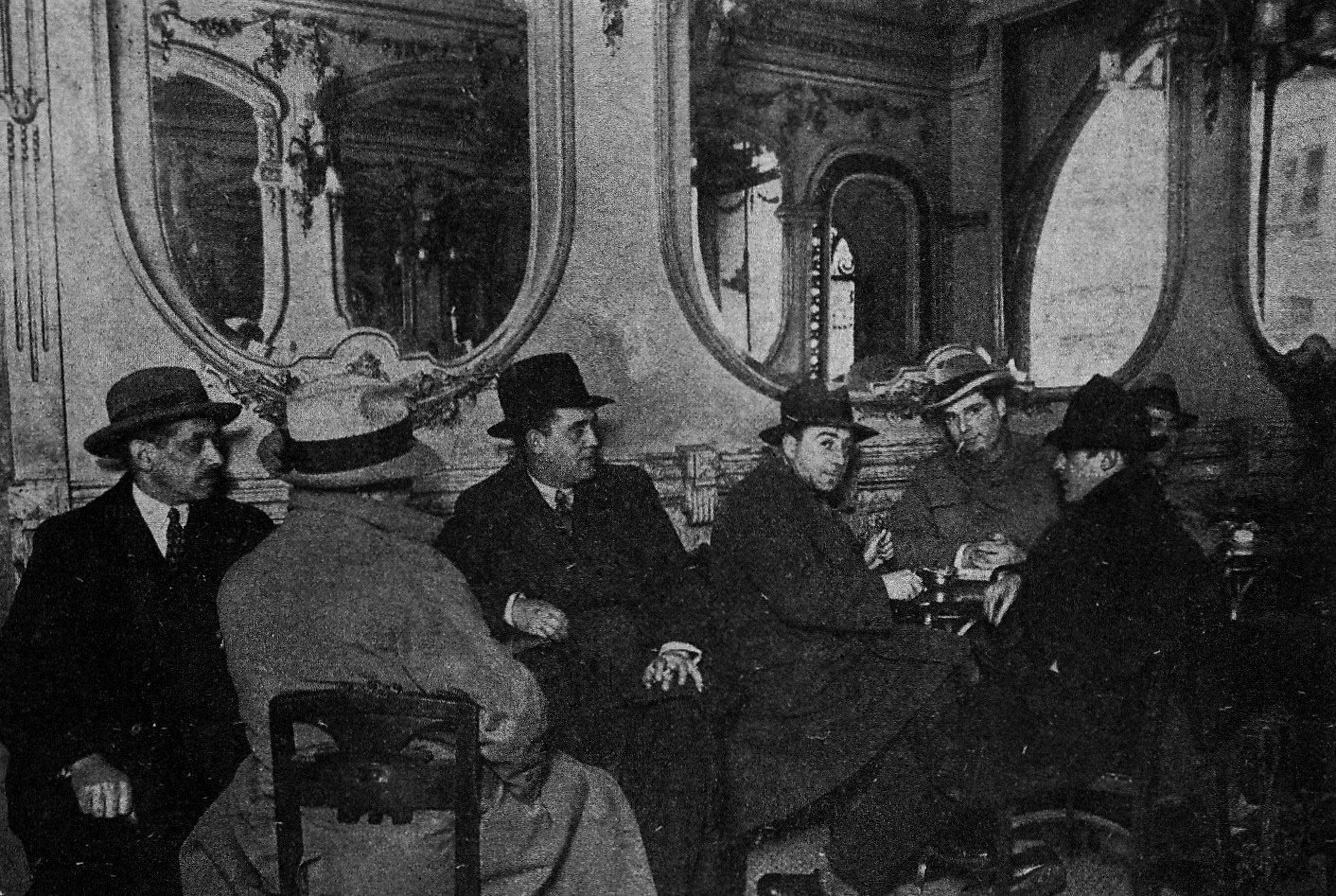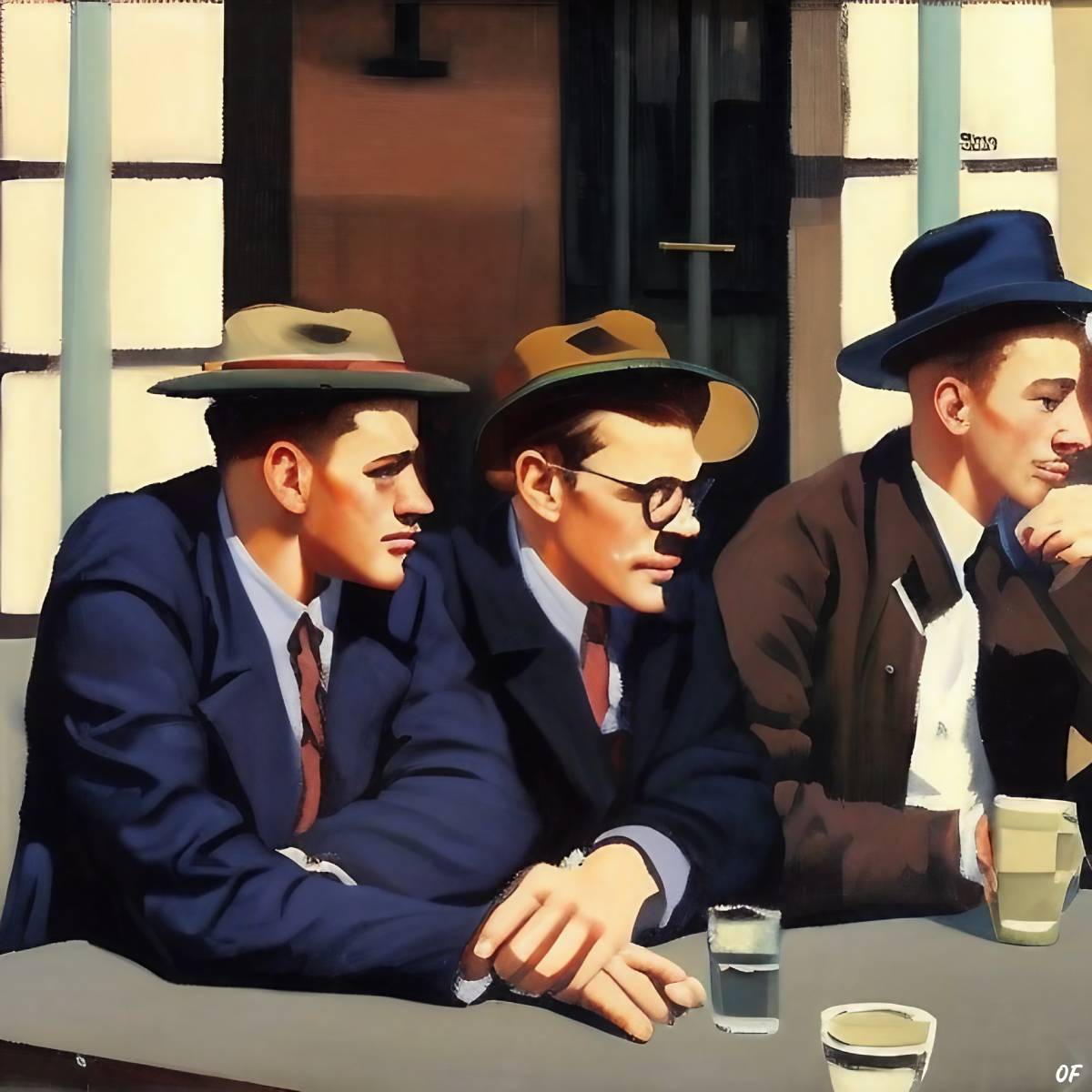The year is 1956, and you’re sitting in a coffee shop called Bona Buvare. On the table next to you, a group of men is speaking to each other in bright, cheerful voices. “Vada that capello,” says one, pointing across the room. “Very zhooshy,” says another, nodding his head approvingly. These men speak in Polari—a secret language that was popular in parts of Britain. In the 1960s, Polari drifted out of fashion, but in recent years, it has enjoyed a glittering resurgence.
What is Polari?
Polari is a language with about 20 core words, including bona (good), vada (look), and zhooshy (stylish). This basic vocabulary is supplemented by hundreds of lesser-known words, including buvare (drink) and capello (hat). Any of these words can be dropped into a normal English sentence, completely disguising the meaning: “Vada that capello. Very zhooshy.” It’s an easy way to shield a conversation from eavesdroppers.
The words in Polari are drawn from all kinds of sources, including Cockney Rhyming Slang, U.S. Air Force slang, drug user slang, and words spelt backwards, such as ecaf (face) and riah (hair). It is also linked to an older language called Parlyaree, which used to be spoken by fairground showmen and traveling entertainers in the 17th century. Parlyaree has its roots in Romani, with many traveling entertainers originally coming from Romania. All in all, the Polari language is a vibrant mishmash of slang and languages, and it’s hard to be sure how many words are derived from each of these roots.
Who spoke Polari?
Considering its links to Parlyaree, it should be no surprise that Polari was once popular in fairgrounds and circuses. The secret words served as a useful marker of group identity, and helped these traveling communities to carve a place for themselves at the edges of mainstream culture. Polari was also used amongst theater people, who probably learned it from traveling entertainers.
Most commonly of all, Polari was spoken by the queer community of 20th-century Britain. As late as the 1960s, homosexuality was still illegal in the country, which made it difficult for gay people to interact with one another in public spaces. If they were caught discussing their sex life in a café, gossiping about crushes on the London Underground, or declaring their love in the back of a taxi, they could have ended up locked behind bars.

That’s where Polari came in. Many nouns were related to people and body parts, while the verbs concerned sexual acts. A dish was a butt, or an attractive man. A trade was sex or a sexual partner. An omi was a man, a palone was a woman, omi-palones were effeminate/gay men, and charver was gay sex. By the end of the 1950s, Polari become a vital component of gay life in Britain, allowing ostracized people to talk to each other without risking the wrath of the law. If a police officer heard a pair of men discussing the “bona dishes” on their latest “trades,” they would have no idea what had just been said. Polari speakers could express themselves with zest and flair, breaking free from the world of silent shame which they had been forced to inhabit for so long.
Polari became so inextricably linked to queer culture that modern historians, looking back on the period, sometimes refer to it as a gay language or gay slang. It was predominantly used in London, but spread outside the city too, particularly on British merchant navy ships, where a lot of gay men signed up as waiters and entertainers. All the while, the British authorities had no idea that this underground language was being spoken right beneath their noses.
Do gay men still use Polari?
In the 1960s, Polari fell out of fashion. There were numerous reasons for this, but perhaps the most prominent was a popular BBC radio show called Round The Horne. The show starred Hugh Paddick and Kenneth Williams, who played a pair of gay men named Julian and Sandy. The show’s tone was light and humorous, with Julian and Sandy using Polari words to make jokes and euphemisms, often at the expense of their straight friends. The two characters quickly became the language’s most famous users. Kenneth Williams, in particular, was a household name.
The mainstream popularity of Round the Horne was a problem. Now that the public knew about Polari, and even spoke a number of words, it could no longer function as a secret language. By simply uttering a Polari word, a gay person risked attracting the suspicion of a police officer, assuming that the officer was familiar with Round the Horne. In other words, the language was no longer a way to disguise their sexual preferences. Instead, it made those preferences obvious to anyone who heard you speak.
The gay community could have adapted Polari, or replaced it with other languages, but in the end, this wasn’t necessary. In 1967, homosexuality was partially decriminalized in the United Kingdom, which meant the gay community no longer needed to communicate secretly. Polari lost its importance, and without gay men teaching it to each other as they had done before, it nearly became a dead language.
Modern resurgence
Polari is an endangered language, but it is not a lost language. In 2000, Paul Baker, a leading historian in the field of Polari, surveyed 800 gay men. Of those questioned, about 50% hadn’t even heard of Polari, let alone knew how to speak it. Some older people, mainly gay men who worked in the theater during the 1960s, still used Polari in conversation, but this was exceedingly rare. Around the same time, Boyz magazine described Polari as “evil,” arguing that it had alienated the gay community from the rest of British society.
But in recent years, the language has enjoyed a resurgence. People have begun to celebrate Polari as a symbol of resistance in the face of repression, and an effort has been made to keep the language alive, especially by businesses and writers. There is now a bar in Manchester called Polari Lounge, which is a popular hangout for young people. There is also an online magazine called Polari, which acts as a platform for LGBT arts and culture. Writers are producing Polari works, including a short film called Putting on the Dish. This film is set in 1960s London, and the characters speak Polari throughout. In 2016, David Bowie released a song containing Polari terms, and in 2019, a Polari opera was performed in Spain: The Sins of the Cities of the Plain.
Polari has even made an appearance within the Church of England. In 2017, some trainee priests performed an evening prayer in Polari, as a way to celebrate LGBT History Month. This prayer referenced God as “the Duchess,” which was very controversial. Some people called it an affront to Christianity, but others disagreed. They said prayers could be delivered in any language and that Polari worship was just as valid as Latin, English, or anything else.
Some Polari words have also entered mainstream slang. Naff (bad or tacky) is a prominent example of this, as well as camp (effeminate) and ogle (to look admiringly), which all appear in the Oxford English Dictionary. Zhoosh (to smarten up) is also part of many people’s vocabulary after being heavily used in the television series Queer Eye for the Straight Guy. At the start of 2022, the popularity of this word was explored in detail by a New York Times article: ‘Jeuje,’ ‘Zhoosh,’ ‘Zhuzh’: A Word of Many Spellings, and Meanings.
Other secret languages
Polari isn’t the only example of a language used by an ostracized community. In Indonesia, where homosexuality is technically legal but often repressed, a slang vocabulary called Bahasa Binan is sometimes spoken. In South Africa, where homosexuality was only legalized in 1998, IsiNgqumo and Gayle are used by gay people in certain settings. Swardspeak is used in the Philippines, and Lubunca is used in Turkey. In an ideal world, none of these languages would be necessary, and gay people wouldn’t need to use secret languages in public. But we do not live in an ideal world. Just like Polari in the 20th century, these languages have become an important way for marginalized groups in contemporary culture to express themselves in public.


